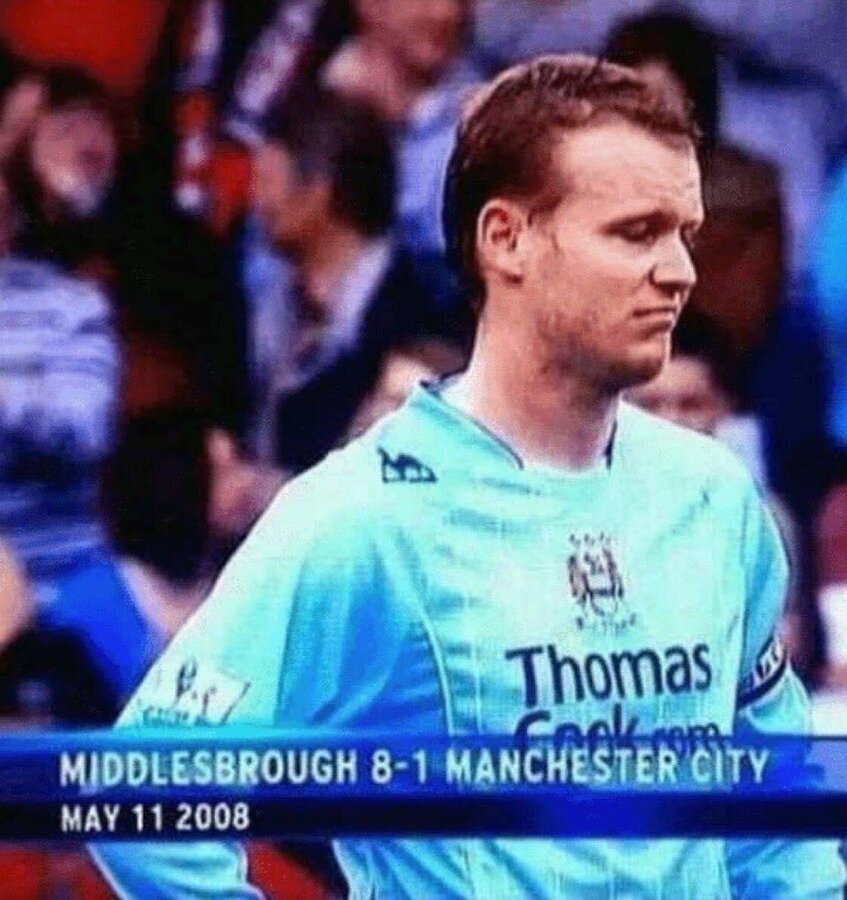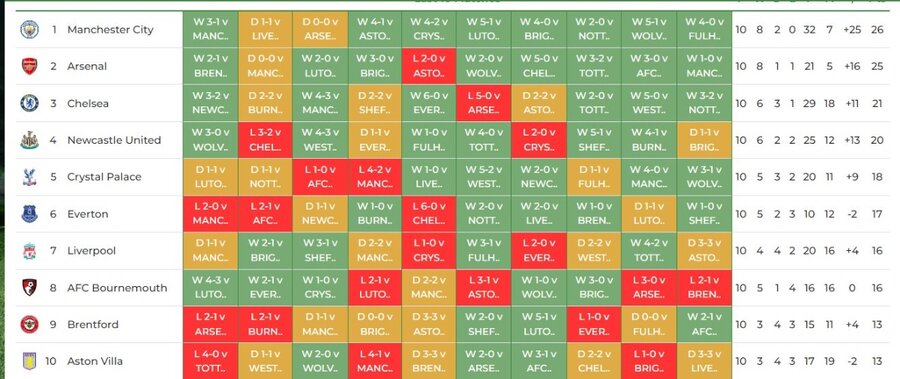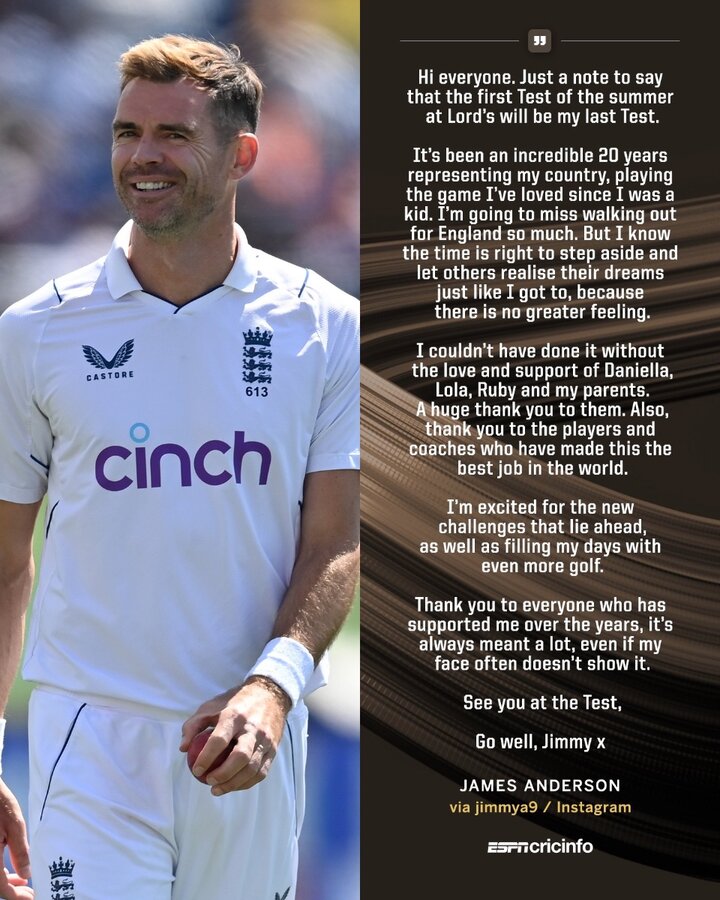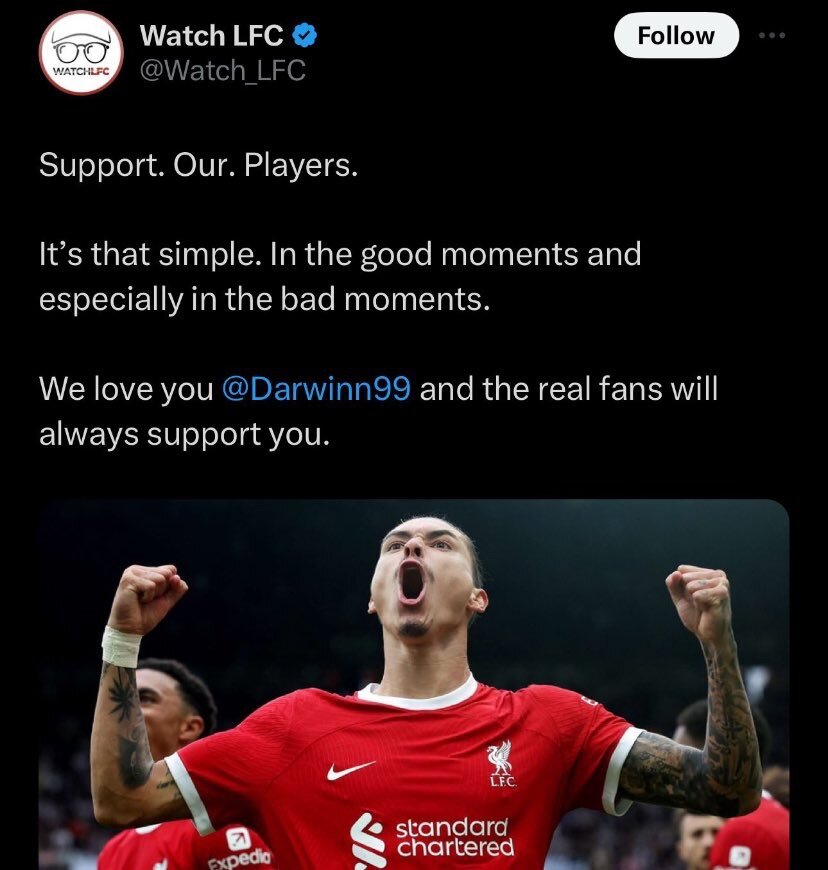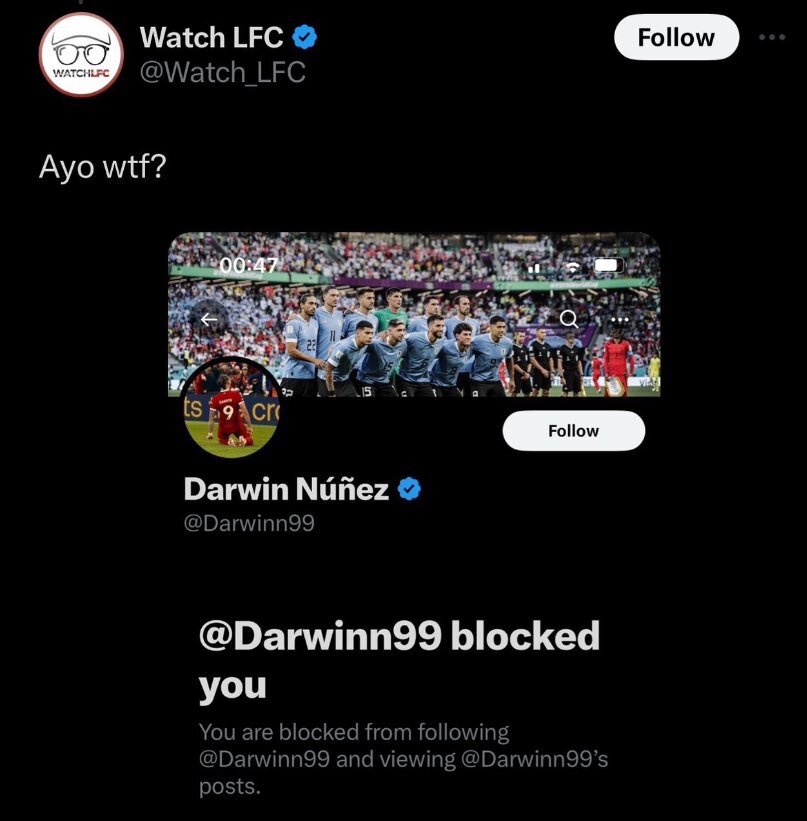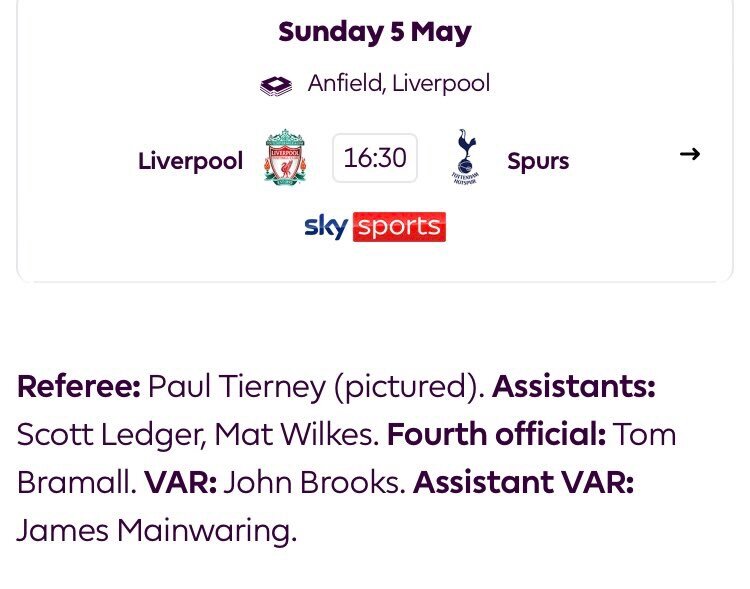-
Posts
14,601 -
Joined
-
Days Won
5
Content Type
Profiles
Articles
Forums
Store
Everything posted by Vincent Vega
-
-

Funny Pics that aren't worth starting a thread for
Vincent Vega replied to Shifty's topic in GF - General Forum
- 19,049 replies
-
- 2
-

-
- change the thread title
- fuck biscan the dog
- (and 3 more)
-

Aston Villa (A) - Mon 13th May 2024 (8:00pm)
Vincent Vega replied to Trumo's topic in FF - Football Forum
Looking at our form over the last ten games, it’s a good job both Villa and Spurs form fell off an even bigger cliff or we might have been going into the weekend under pressure for a top four spot. -
He could play as part of a front three, or as the advanced player in a midfield three. He can also play on the wing if you want to change the system. Great players can play multiple positions, it would be a great problem for any manager to have.
-
Our midfield of Henderson, Wijnaldum and Fabinho, ably supported by Milner wasn't especially creative, but nobody ever outworked or out-muscled us, and our defensive record with those three paying was vastly superior. I hope we're looking at a couple of players with the qualities of Fab and Gini, and then maybe we can get the best out of Macca in a more forward creative role. One player I'd love us to sign but is likely an impossibility, is Florian Wurtz. There are strong rumours that Real Madrid want him, but want him to wait until summer 2025, and City have also been linked, so we will walk a million miles from that deal even if we had identified him.
-
Top quality rambling here. I especially enjoyed the hot dogs bit
-
Warnock is a bad bellend as a pundit. Another former red who overcompensates when discussing anything Liverpool as he doesn’t want to come across as biased. Most of his takes on that Sky Sports News football show on a Monday morning are bollocks. And his Bobby Firmino style Turkey teeth annoy me.
-

NFL Discussion and Fantasy League thread
Vincent Vega replied to odris's topic in GF - General Forum
Judge Culpepper once fined me for lewd behaviour. -

NFL Discussion and Fantasy League thread
Vincent Vega replied to odris's topic in GF - General Forum
I think I might actually change my forum name to Storm Duck, fucking genius. -

NFL Discussion and Fantasy League thread
Vincent Vega replied to odris's topic in GF - General Forum
Some incredible names on these new players here. Anyone would think they had been created by @Remmie in the suggest a new forum name for me thread. -
It was me that posted about there being a cut off for going into administration, but I did state that it could from a blue on of their forums. The poster stated that if a club went into administration after the end of March, the points deduction came in the following season. This was designed to prevent a club that was now safe or already down taking the piss to avoid a sanction. I’ve since read that this is a Football League rule, and not a Premier League rule, but haven’t seen anyone confirm this 100%. Another thing I’ve read in the last few days, again from a blue, is that there is nothing set in stone in PL rules that administration equates to an automatic 9 points deduction, this is just assumed as it was the punishment given to Portsmouth. Apparently the PL could decide the punishment was 20 points if they felt Everton were trying to take the piss and assume going into administration now would automatically mean they had gamed the system, but that sounds like a litigious nightmare to me.
-
He does get a proper send off, and at the home of cricket, Lords. What a player he had been though. I think he was actually a better player in his 30s than he was in his 20s. He used his experience and was certainly much more effective away from home than in his first decade. The wickets have started to dry up the last couple of years, so I do think the time is right.
-

Michael Edwards Return Confirmed
Vincent Vega replied to Vincent Vega's topic in FF - Football Forum
Also bringing in Pedro Marques from Benfica as director of football development. Makes sense, Benfica are the kings of buy low, sell high. -

Funny Pics that aren't worth starting a thread for
Vincent Vega replied to Shifty's topic in GF - General Forum
- 19,049 replies
-
- 1
-

-
- change the thread title
- fuck biscan the dog
- (and 3 more)
-
-
Just typical “legends in their own minds” Everton fan hyperbole. Nobody else sees them that way, so they input this stuff themselves to make themselves feel better. They must be one of the only sets of fans that revel in relative success that occurred before half of them were even born. Newcastle fans are rightly embarrassed about their lack of recent success, but Everton go on as if they wiped the floor with all comers in recent memory. I was born in 1970 and they have been utter shite for the entirety of that time apart from a brief spell in the mid to late 80s and even then they were overshadowed by us.
-
I read this article on The Times website last week and found one part of it very interesting on City's wage bill and how it appears a large proportion of it appears to have been passed off onto the wider City Group of football clubs they own. I can't believe the ruling bodies haven't had something to say on this practice. Anyway I found the whole article interesting and well worth a read. The fight for Premier League’s future – and how it will be decided Legal challenges, the end of the ‘big six’, 115 charges facing its champions, new financial rules and a looming regulator place English football’s top flight at a crossroads Martyn Ziegler, Chief Sports ReporterThursday May 02 2024, 8.30pm BST, The Times The Premier League is at a critical juncture in its history. It is facing the first legal action against its rules from a member club; the old “big six” bloc is no more; the biggest shake-up in its financial rules for more than a decade is on the horizon; investigations and hearings into alleged rule breaches have caused huge disruption and spiralling legal fees; domestic TV rights have flatlined; looming on the horizon is the hearing into serial champions Manchester City’s 115 charges for breaching rules. And then there is the uncertain effect of an independent football regulator on the most popular and financially successful league in the world. Associated party transactions – the legal challenge A legal challenge by a club — believed to be Manchester City — against the Premier League rules for associated party transactions (APT) strikes at the heart of its financial rules. It is also believed that the legal action — which would mean taking the league to arbitration over the APT rules — includes a potential claim by the club for damages. The APT rules cover sponsorship and commercial deals with companies connected to the clubs, and any player transfers between clubs in the same ownership group, to ensure they are of “fair market value”. One example is Chelsea’s sale of two hotels to a sister company for £76.5 million, which has still not been signed off by the Premier League after ten months. A legal defeat would mean any constraints over inflated sponsorship deals — the most blatant example in football being the Qatar Tourist Authority’s €200million-a-year deal (about £171million) with Paris Saint-Germain announced in 2014 but backdated to 2012 — would be removed. There are already concerns among City’s rivals that their multi-club ownership model provides them with big financial advantages, with large salary costs farmed out to the City Football Group while the club enjoys the financial profits. The most recent accounts show City had 520 employees and a wage bill of £423million. Liverpool, with a smaller turnover and wage bill (£373million) had 1,005 employees. Last season, City made a profit of £80.4million, while the City Football Group made a loss of £112million. ***By my calculations City are paying 520 employees £423m, an average of £813,461.00 each per year, whilst Liverpool (a bigger club and direct rival) are paying 1005 employees (almost twice the amount City are paying) £373m, an average of £371,144.00 each per year. And this still won't include their off the books payments made to back accounts set up in Abu Dhabi. They are set up in such a way that no other club apart from an unrestrained Newcastle can ever compete with them.*** End of the ‘big six’ and new alliances The bloc of Arsenal, Liverpool, Chelsea, Tottenham Hotspur and the two Manchester clubs began having separate discussions in 2016, aimed at securing a larger chunk of overseas TV rights — something they achieved in 2018. The ill-fated launch and collapse of the European Super League in 2021 was effectively the end of that alliance. That may be a good thing for English football but it means the Premier League is now a shifting pattern of different allegiances around different issues. Liverpool, Arsenal and Spurs are now more likely to vote with West Ham United and Crystal Palace than City and Chelsea. But the new alliances are not fixed. For example, Newcastle voted with City against APT rules, but the two state-connected clubs were on different sides of the divide when it came to this week’s vote on a spending cap called “anchoring”, which would restrict the top teams to spending a proportion of the amount the bottom club receive in television and prize money on transfers, wages and agents. There is also the influence of “soft power” on votes. Sheffield United, owned by Saudi prince Abdullah bin Musaid Al Saud, voted against tougher APT rules and alongside Newcastle, who are owned by the Saudi Public Investment Fund (PIF), which is headed by the kingdom’s Crown Prince Mohammed bin Salman. “It appeared to us the little prince was just doing what the big prince told him,” one club chief said. The rise of private equity companies owning or investing in Premier League clubs is also a potential issue, given the huge economic influence wielded by sovereign wealth funds in the Gulf. The Saudi PIF has investments in Clearlake Capital, the majority owner of Chelsea, and the Premier League had to obtain written assurances that the PIF has no involvement in the running of the club. A new financial world There is a philosophy that there should be no restrictions on spending at all — as was the case up until 2013 — but it is clear that the majority of top-flight clubs believe constraints are necessary to keep it as the most competitive major league in the world — they believe that is the reason it is the most popular. The Profit and Sustainability Rules (PSR), limiting losses to £105million over three years, will be no more from the 2025-26 season and instead there will be the squad cost rule (SCR): no Premier League club can spend more than 85 per cent of their turnover on wages, transfers and agents fees. There have been concerns that SCR will mean those clubs with the biggest revenues and scope to grow them, such as City and United, will maintain and grow their advantage — and especially if City’s legal challenge succeeds and sponsorship deals with associated parties do not have to be of fair market value. Given domestic TV rights have flatlined — though still performing better than their European rivals — commercial deals will increase in importance. That has led to the idea of anchoring: a proposal that club sources said was agreed “in principle” at a meeting this week, which would restrict the top teams to spending a proportion — perhaps five times — of the amount the bottom club receives. That means that no matter how high your revenues go, there is a limit to what you can spend. The Manchester clubs as well as Aston Villa — who for some reason have sided with City in recent votes on financial issues — opposed it, while Chelsea abstained. Could anchoring too be subject to a legal challenge by City, or even by the PFA? The Premier League will now carry out extensive legal analysis of the idea with that possibility in mind, with the aim of it going to a full vote in June. Alleged rule breaches and reputational damage Even clubs who believe that the points deductions imposed on Everton and Nottingham Forest for PSR breaches were entirely justified accept that it has not been a good look for the Premier League. The lack of a fixed tariff, the changing rules over when charges should be dealt with, the uncertainty over points deductions then being changed on appeal, and now legal action from Leicester City, who will be back in the top flight next season and immediately facing sanctions, have all been testing issues for the Premier League’s reputation. That will all be small potatoes when the hearing into City’s 115 alleged rule breaches takes place — expected to be October with an outcome next year. If most of those are proved — and City deny any wrongdoing — then most clubs believe the most successful English club of the past decade would have to be demoted. The Premier League is also wrestling with an investigation into Chelsea over apparently undeclared payments relating to football transfers made during the Roman Abramovich era and self-reported by the new owners. All this is time-consuming and costly for the Premier League — with its legal bill now understood to be more than £20million a year. Should either the City or Chelsea cases lead to sanctions, then a dozen or more of their rival clubs could consider compensation claims. Regulator is uncharted territory The incoming independent football regulator is a voyage into the unknown. There is nothing like it in any other major European country and the government says it will ensure suitable owners and financially sustainable clubs. Yet its powers will go significantly further. The Premier League has always had the whip hand when it comes to the money it hands out to the rest of football: take it or leave it, effectively. The EFL opposes parachute payments for relegated clubs, saying they distort the Championship and provoke the crazy spending there, but there is little they can do other than accept them. The regulator will have the “backstop” power to impose a financial settlement on the Premier League. Some may view that as a good thing, but it certainly represents another challenge for the Premier League. The greatest concern is around the regulator’s future powers. Not only did the government rule out giving the regulator power to prevent more English clubs being bought by foreign states — despite suggesting that such a ban should apply to newspapers — but the Football Governance Bill states explicitly that decisions on future or incumbent owners “must also have regard to the foreign and trade policy objectives of His Majesty’s Government in the United Kingdom”. Does that mean the UK’s important trading partner Saudi Arabia, which owns a club, should be given special treatment? Will the Foreign Office have to approve any action by the regulator against a state connected club? “The Government appears to have written a stronger role than anticipated for itself into this regime,” the Premier League’s chief executive Richard Masters wrote to the DCMS select committee this week. “This may lead to pressure in the future for the Secretary of State to further expand the scope and powers of the IFR beyond financial sustainability. If this goes too far it may conceivably present issues with Fifa and Uefa, whose statutes ban state interference in football. The greatest concern is around the regulator’s future powers. Not only did the government rule out giving the regulator power to prevent more English clubs being bought by foreign states — despite suggesting that such a ban should apply to newspapers — but the Football Governance Bill states explicitly that decisions on future or incumbent owners “must also have regard to the foreign and trade policy objectives of His Majesty’s Government in the United Kingdom”. Does that mean the UK’s important trading partner Saudi Arabia, which owns a club, should be given special treatment? Will the Foreign Office have to approve any action by the regulator against a state connected club? “The Government appears to have written a stronger role than anticipated for itself into this regime,” the Premier League’s chief executive Richard Masters wrote to the DCMS select committee this week. “This may lead to pressure in the future for the Secretary of State to further expand the scope and powers of the IFR beyond financial sustainability. If this goes too far it may conceivably present issues with Fifa and Uefa, whose statutes ban state interference in football.”
-
- 7,469 replies
-
- 3
-

-
- like throwing a horse onto the pitch
- marmite nunez
- (and 5 more)
-

Serious things you shouldn't laugh at
Vincent Vega replied to She Knows It's topic in GF - General Forum
- 1,334 replies
-
- 2
-

-

-
- electric blue
- mock the afflicted
- (and 4 more)
-

Serious things you shouldn't laugh at
Vincent Vega replied to She Knows It's topic in GF - General Forum
- 1,334 replies
-
- electric blue
- mock the afflicted
- (and 4 more)
-
Interesting.
-
Just seen a blue saying that the administration would have had to happen in March if the points were to come off this season, if it happens beyond the end of March the points deduction applies in the following season.
-

Halsey: Referee standards have dropped to alarming levels
Vincent Vega replied to TLW's topic in FF - Football Forum
-

PODCAST: West Ham 2 Liverpool 2 - Match Reaction
Vincent Vega replied to tlw content's topic in FF - Football Forum
On the subject of which games the referees get and which they don’t, I saw this list on Twitter. Apparently it came from one of the newspapers. -
Hopefully Mike Ashley is waiting patiently in the wings for the day they go into administration before riding to the rescue.


